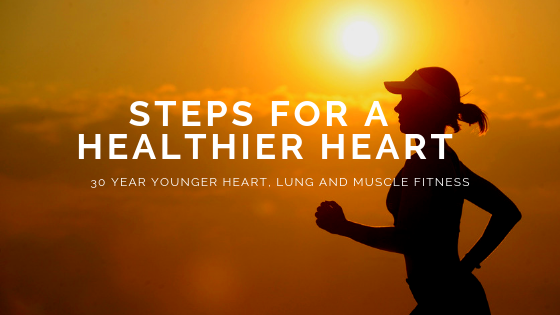How to have a healthy heart for life? Have you asked this question before? While the answer is quite obvious and easy to understand, it is the implementation of it that is the most difficult part for many of us. All of us are well aware that we need to exercise for good health. And recent research has found even more evidence that lifelong exercise habit is going to make us stay stronger and healthier well into our senior years.
Study and Findings
According to the findings, the people who have been exercising regularly for decades have stalled their aging process. The study group was comprised of 70 year olds who exercised on a regular basis . This group was found to have healthier heart, lung and muscle fitness of healthy people that were atleast 30 years younger than them! This group goes for a walk or run regardless of the weather outside. Rain or shine, or snow, they make it a habit to run or walk. This lifelong exercise helped them with their muscle health and cardiovascular health.
According to the exercise physiologist Scott Trappe (who headed the the study at the Human Performance Laboratory at Ball State University): “We saw that people who exercise regularly year after year have better overall health than their sedentary counterparts. These 75-year-olds — men and women — have similar cardiovascular health to a 40- to 45-year-old.”
Study Groups
The study group had 70 healthy participants divided into three groups.
Group 1: Those who did lifelong exercise and were on average 75 years old. They primarily kept their heart rates up through running and cycling. They were folks who used to have structured exercise four to six days a week for a total of about seven hours a week.
Group 2: The second group were also on average, 75 years old. But they did not have a structured exercise, however, they might have been doing occasional leisure walking or golf.
Group 3: The third group consisted of young exercisers who were, on average, 25 years old and worked out with the same frequency and length of time as the lifelong exercisers.
Health Assessment
All participants were assessed for Cardiovascular health and muscle health.
Cardiovascular health was measured by having participants cycle on an indoor bike to determine their maximal oxygen uptake (or VO2 max). VO2 max is the measurement of the maximum amount of oxygen a person can use during intense exercise and is an indicator of aerobic endurance.
The aerobic profile of the participants’ muscles was measured, they also looked at specific enzymes that provide fuel to the working muscle and help break down carbohydrates and fats.
The study suggest a significant benefit of lifelong exercise for both muscle health and the cardiovascular system. Although the study was relatively small, the findings need to be given attention. The findings were published in the Journal of Applied Physiology in August.
“Lifelong exercisers had a cardiovascular system that looked 30 years younger,” says Trappe. For an average adult, the ability to process oxygen declines by about 10 percent per decade after age 30. So this study has given extremely valuable information to stay younger and healthier.
“It’s kind of a slow decay over time that’s probably not so noticeable in your 30s or 40s,” says Trappe, but eventually as years go on, becomes apparent. People can get out of breath more easily and may have difficulty pushing themselves physically.
The age-related reduction in maximal oxygen uptake (or VO2 max) is directly associated with an increasing risk of multiple chronic diseases, mortality and loss of independence. Maintaining a strong heart and lung system has been shown to decrease these health risks.
The findings for muscle health were even more noteworthy. With respect to muscle well being, the discoveries were much more eye opening, says Trappe. Trappe says researched were shocked to discover the 75-year-old muscles of long lasting exercisers were about equivalent to the muscles of the 25-year-olds. “If I showed you the muscle data that we have, you wouldn’t know it was from an older individual. You would think it’s from somebody that’s a young exerciser,” he says.
Trappe says the discoveries are clear: 30 minutes to an hour of exercise daily might be the way to a solid life. You don’t need to run long distance races or take part in cycling competitions to be healthy. “If you want to do 30 to 45 minutes of walking a day, the amount of health benefit you are going to get is going to be significant and substantial,” he says. “Will it equal the person training for competitive performances? No. But it will outdo the couch potato.”
Highlights from the findings:
- Lifelong exercisers had a cardiovascular system that looked 30 years younger
- The 75-year-old muscles of long lasting exercisers were about equivalent to the muscles of the 25-year-olds.
- 30 – 60 minutes of daily exercise is going to give you a significant health benefit well into your senior years.
While the study was small and the findings need to be confirmed by the American Heart Association, they present a strong case for lifelong exercise that is inexpensive and accessible for everyone.
It is no secret, and everyone knows, now it is time to put to test.
This article originally appeared in NPR.
Fitbit Alta HR Fitness trackers

